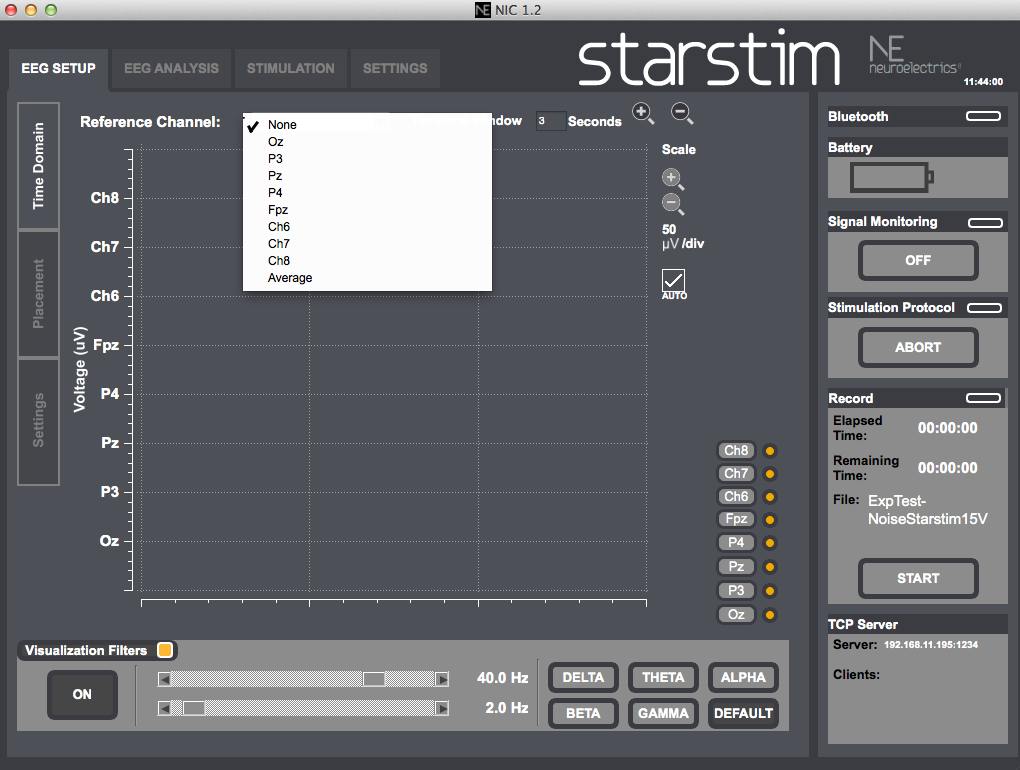Difference between revisions of "MediaWiki:NE Tutorials"
(→Referencing EEG data) |
(→Referencing EEG data) |
||
| Line 31: | Line 31: | ||
You can "re-reference" in this way in NIC, but this will only have an impact on visualization: since you can always do this mathematical operation later, once the data is saved, all data is saved raw. | You can "re-reference" in this way in NIC, but this will only have an impact on visualization: since you can always do this mathematical operation later, once the data is saved, all data is saved raw. | ||
| + | |||
| + | [[File:referencing.png|250px|thumb|left|]] | ||
| + | |||
| + | |||
| + | Once your data is saved, you can re-reference it using, e.g., Matlab. | ||
== Visualizing EEG signals in real time == | == Visualizing EEG signals in real time == | ||
Revision as of 10:55, 25 November 2013
In this page we provide some tutorials on a variety of topics. Enjoy, and send us feedback!
Contents
- 1 EEG
- 1.1 How to record EEG
- 1.2 Stimulation with Starstim
- 1.3 Referencing EEG data
- 1.4 Visualizing EEG signals in real time
- 1.5 Marking your data with manual input
- 1.6 Using the TTL receiver to mark your data
- 1.7 Receiving TCP/IP triggers
- 1.8 How to use the SD card
- 1.9 Using NIC Offline
- 1.10 Using Matlab to visualize EEG
- 1.11 References
EEG
How to record EEG
We provide here an introduction to NIC, our software for device control. To learn more about tDCS and EEG, please see also this Jove video:
StarStim tCS EEG recording (Jove) <ref> Schestatsky, P., Morales-Quezada, L., Fregni, F., Simultaneous EEG Monitoring During Transcranial Direct Current Stimulation. J. Vis. Exp. (76), e50426, doi:10.3791/50426 (2013). </ref>
{{#ev:youtube| JdcG1Qdq4h8|600|center|An introduction to NIC}}
Stimulation with Starstim
{{#ev:youtube|I5uU20ut8Fk|600|center|Configuration of NIC for stimulation: from simple to advanced}}
Referencing EEG data
You can reference your data in different ways.
To record data you must always place first the CMS/DRL electrodes..
This provides an electrical reference to your data. Remember that voltages are only defined in relation to one another (there is no physical meaning to an absolute voltage!).
For visualization purposes you can always choose another reference: this will be another electrode or the electrode average. Using another electrode or average of electrodes as reference will have the effect of greatly reducing common noise: referencing just means subtracting the voltage from another electrode from the measurements. If there is some common noise, it will cancel.
You can "re-reference" in this way in NIC, but this will only have an impact on visualization: since you can always do this mathematical operation later, once the data is saved, all data is saved raw.
Once your data is saved, you can re-reference it using, e.g., Matlab.
Visualizing EEG signals in real time
Marking your data with manual input
Using the TTL receiver to mark your data
Receiving TCP/IP triggers
How to use the SD card
Using NIC Offline
Using Matlab to visualize EEG
References
<references/>
